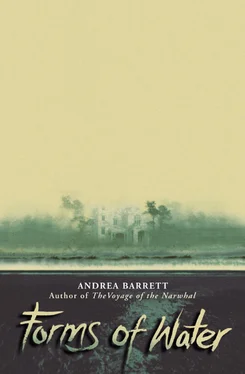“Some dream,” she said.
He moved quickly away from her and she smiled at him. He looked over the seat at Delia, who was still sleeping, and at Lise, whose eyes were fixed on the road. Then he looked back at Wendy and made the strangest face, half sheepish grin and half rueful grimace. She kept on smiling. Her family was so far away that they might as well be on another planet. She stretched herself and smiled and smiled until Roy leaned back to zip his fly and she caught sight of Win’s eyes, which were open.
FROM THE “LETTERS TO THE EDITOR” OF THE PARADISE VALLEY Daily Transcript:
October 14, 1933
Dear Sirs:
I write in support of Mr. William Kessler’s recent proposal that valley residents join in sending letters to the Governor, deploring the placement of graves in the newly dedicated Paradise Valley Memorial Cemetery. “ ‘The woof of time is every instant broken and the track of generations effaced,’ ” he said, quoting de Tocqueville. “ ‘Those who went before are soon forgotten; of those who will come after, no one has any idea. ’ ”
And truly the Commission’s astonishing oversight is deplorable. Bad enough that some 6,000 of our ancestors’ graves must be disturbed, and their remains removed to this new and sterile ground south of the dam site. But that the new graves should be jumbled together so grotesquely, without regard for their placement in the original cemeteries or even for the towns where they once lay — one feels they might as well have been bulldozed into a common pit. Families and neighbors have been separated; old enemies placed bone by bone. And meanwhile the Commission insults the dignity of the living just as surely every day.
Was it truly necessary for our own Cecil Blake, now approaching his 80th year, to be forcibly removed from his hermit’s shack in Nipmuck and sent to an institution simply because no one wanted to be responsible for him now that so many of his neighbors have left? Did the railroad have to stop Sunday service on our branch line and reduce service the rest of the week to one train per day? Must the Commission rent out the homes it has already purchased — homes that once belonged to our neighbors — to tourists, so they can live cheaply while gawking at our demise?
One insult follows another; it is almost too much to bear. The first noises of construction are in the air, and the time approaches when all of us must leave. But let us not leave quietly; let us not allow these insults to pass unremarked. Send letters, as Mr. Kessler urges, to our governor and to our representatives in Boston. We cannot leave our homes to our children, but we can leave behind an accurate record of what has happened here.
Frank B. Auberon, Sr.
Pomeroy
Part IV The World Is Made Up of Our Ideas
BONGO, WHINING TO GET OUT OF THE VAN, WOKE BRENDAN well before dawn; Brendan, waking flat on his back in a dark, airless space, felt a jolt of panic that kept him from sleeping again, even after he realized where he was. He listened to his galloping heart for a minute and then he called Henry’s name twice. Bongo barked, and Henry opened the door of the van and crawled in.
“Don’t you want to sleep some more?” Henry yawned.
“No,” Brendan said. The people who might be looking for them had likely gone to bed late and would sleep for hours. This was the time to travel — through the hours of the night watch, during the time when he used to wake silently, gather with the others in the choir stall, chant the psalms of matins, and then watch until dawn arrived. During his first years at the abbey, he’d managed to wake his body each night but his heart had been dull and heavy and his hours of meditation had only been waking sleep. Over time he’d gained a certain alertness, and by the end of his fifth year he’d come to cherish those hours beyond all others. Sometimes, in the utter quiet, he’d thought he heard the earth spinning on its axis. Even now he often woke in his bed at St. Benedict’s at two or three in the morning and rested silently until dawn, unable to pray but still able to watch and wait.
Today he wanted to spend those hours driving. He sat up cautiously — his neck felt frail and thin inside his brace, and his intestines felt as painful and twisted as his toes. “We’ll miss all the traffic,” he told Henry. “The road will be clear, we’ll get to watch the sunrise. We’ll be at the reservoir in time for breakfast, and then we’ll have the whole day. Doesn’t that sound good?”
Henry yawned so widely his jaw cracked. “If it’s what you want. I can drive if I get some coffee in me.” He clipped Bongo to a leash and stepped outside the van with him. In the silence Brendan heard the hiss and splatter as they relieved themselves. “Do you have to go?” Henry asked. “Do you need your cup?”
“No. I can’t.”
“I’ll just say good-bye to Jackson, then.”
“Let him sleep,” Brendan said, thinking how Jackson was just beginning his long journey into solitude. “It’s all he has.”
Henry put on a clean shirt he took from the box at the back of the van, and then he dug out some things from Brendan’s plastic bag and changed Brendan’s shirt and socks for him. The attendants at St. Benedict’s had known how to roll the old socks off and the new ones on, but Henry was astonishingly clumsy. “Didn’t you ever dress Lise and Delia?” Brendan asked.
“They didn’t have feet like this.”
In the dim light from the overhead bulb, Brendan contemplated his twisted toes, which looked like the neat, crushed packets of bones spit up by owls. Henry dabbed at Brendan’s face and hands, and then his own, with a T-shirt moistened with water from the jug he carried for Bongo. Then he slid Brendan off Jackson’s blankets and folded them into a pile on the ground. He lifted Brendan’s chair into the van and, after a good deal of struggling, managed to get Brendan back into his chair and the chair locked back into place. The garage was still dark and there was no sound from Jackson. Henry scribbled a note of thanks on the back of an envelope and wedged it into one of the lawn chairs.
Finally, after Henry gathered up Kitty’s blankets and refolded them in back, and after he settled Bongo and found his Red Wings cap and asked Brendan what time it was and then cursed when he discovered that Brendan didn’t have a watch and that his own was tucked into Jackson’s pocket, he started the van and they eased their way down the rough dirt road. It had been dusk when they arrived and was very dark now. After a minute Henry said, “Hell. I don’t have any idea where we’re going.”
“Just follow your nose,” Brendan said. They banged and rattled through the woods until they came out on a small paved road, which led in turn to a larger road. There, after a few miles, they found an all-night convenience store with a gas pump. Henry bought some gas and some coffee, grumbling about how little money they had left. The sleepy woman who waited on them gave them directions back to their original route.
“Are you awake enough to drive?” Brendan asked. Henry sucked at his coffee as if it were air. Brendan sipped at his — it was fresh and it tasted fine.
“Sure,” Henry said. “I’ll just get something going on the radio here, some chatter to keep us entertained. Then we’ll cruise.”
Brendan had envisioned himself slipping silently through the liquid darkness, alert for the gentle graying that would mark the sun’s arrival, but the talk show Henry settled on was not, after the first shock, so unpleasant after all. It ran from two A.M. until six each day, and as Brendan listened to the various callers, men and women, rational or deranged, opinionated or gentle-voiced or full of rage and confusion, he was touched to think of all these souls looking for answers during the same dark hours in which he and his companions had searched their hearts. Alone in their rooms, connected by telephones and a web of radio waves, they pondered questions and looked for answers in common. Is abortion wrong? the show’s host asked. A flurry of answers followed. Should we educate our children at home? If a burglar enters your home at night, and you shoot him and he has no weapon, is it murder? Some of the talk was foolish, some of it not. Some callers broke into the subject at hand and said, “I want to tell you a story — something that happened to me, that may interest your audience,” and then related the most astonishing tales. Their voices were broken by time and pain; they gave no names. In place of a church, a priest, a confessional, they had the anonymous absolution of strangers.
Читать дальше












